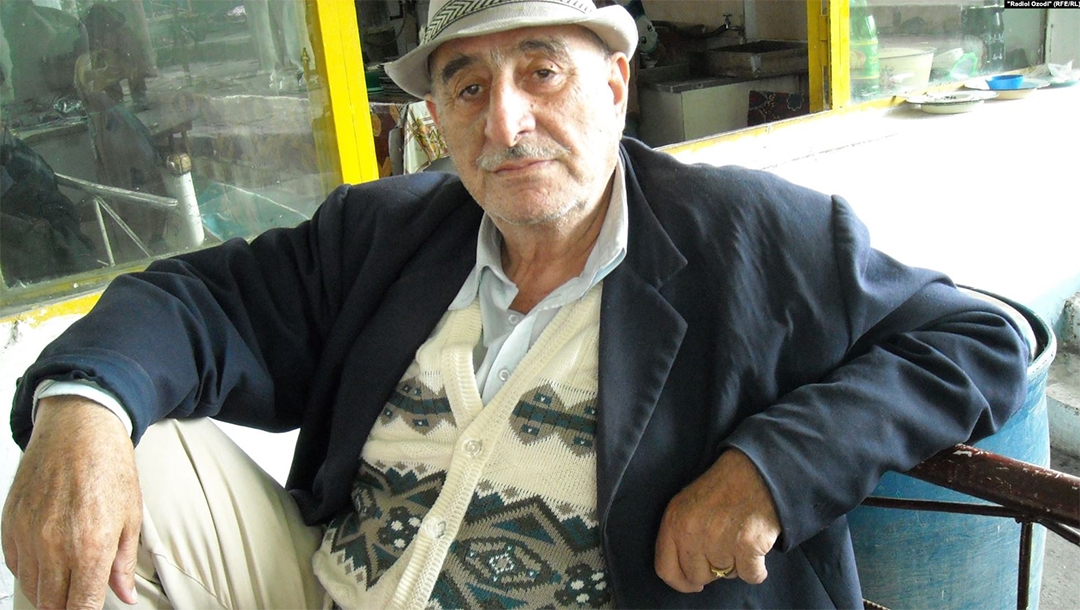For centuries, Jews thrived in Khujand, Tajikistan. Now the city’s last Jew has died.
Published January 22, 2021

(JTA) — For many centuries, the city of Khujand in Tajikistan, a mountainous Muslim-majority country, had been a center of Jewish presence in Central Asia.
But the once-rich communal life of Bukharan Jews in Khujand ended last week with the passing of the city’s last remaining Jewish person: Jura Abaev died Jan. 15 at the age of 93, Radio Free Europe reported Thursday.
ADVERTISEMENT
The Bukharan Jews are a regional minority with Persian roots.
A retired factory worker, Abaev had served as the spiritual leader of Khujand’s synagogue, which according to the Euro-Asian Jewish Congress had closed down in 1999. He was a respected and well-known resident in the city of about 200,000. His neighbors called him “Jura Ako,” meaning “older brother” in the local dialect.
Abaev had five children, all of whom left the country for Israel in the 1990s, along with virtually all of Abaev’s other relatives.
A few dozen Jews, many of them Ashkenazi, still live in the capital of Dushanbe, situated about 150 miles south of the northern city of Khujand, one of the region’s oldest with a 2,500-year-old history.
Tajikistan is one of several Central Asian countries that saw the mass emigration of their Jewish residents following the collapse of the Soviet Union in 1991. The movement also greatly reduced the number of Bukharan Jews in neighboring Uzbekistan and the region’s Mountain Jews — another minority descending from Persia that has many ties to the Bukharan Jews. Many Ashkenazi Jews, whose families came to Central Asia during World War II, have also left.
ADVERTISEMENT
But the exodus from Tajikistan, which once had at least 15,000 Jews, was particularly thorough, owing to a vicious civil war that broke out there in 1992 and raged for five years, resulting in many thousands of fatalities, mass displacement of civilians and extreme poverty.
Many of the few hundred Jews who remained left after that war following the murder of Gavriel Gavriilov, the late leader of the Khaverim Society of Tajikistani Jews, which was set up in the post-communism years in a bid to revive Jewish culture after decades of Soviet repression. The murderers were never caught.
Abaev had also immigrated to Israel — three times, according to the Radio Free Europe report, including after the death of his wife in order to be near his children. But he returned each time, calling Khujand the only home he ever had.
In Khujand, “everybody knows me, greets me and calls me Ako,” he told the Tajikistani media in several interviews in recent years. Abaev walked away from a steady monthly pension that would have allowed him to live comfortably in the Jewish state, he reportedly said.
“Abaev used to say, ‘I felt like I’m a nobody in Israel. When I go out in Khujand, people in my neighborhood smile at me and say, look, Jura Ako is coming,’” Tajik journalist Tilav Rasulzoda, a longtime friend of Abaev, told Radio Free Europe.
“Abaev was happiest when he rode his bike — with a basket attached to its front for groceries — to the Panjshanbe Bazaar” market located about 200 years from his home, a neighbor told the Radio station.
Living alone in a large family home in the center of Khujand, Abaev invited an impoverished family of six to move in with him for free. They cared for Abaev in his old age, Radio Free Europe reported. The family still lives in that house.
Abaev’s parents — a factory worker and a theater actress — led different lives and divorced. He remembered being in abject poverty during World War II, when his family lived on a daily food ration of about 10 ounces of bread.
For decades until the disappearance of the Jewish community of Khujand, Abaev performed the duties of a rabbi, including officiating at funerals, as well as the main caretaker of the synagogue, which was situated near his house, according to the Radio Free Europe report.
In 2015, when Abaev was the only Jew in town, the disused synagogue was knocked down to make room for a shopping mall. Dushanbe, the capital city, now has the country’s only synagogue.
The Jewish cemetery of Khujand, located on its southern edge, holds Abaev’s remains. Until a leg injury three years ago made it difficult for Abaev to get around, he used to be the sole caretaker of that cemetery as well. A local caretaker has taken over that duty with funding from Jewish organizations abroad.
In the absence of Jews in Khujand, there was no one to conduct the religious burial rites at Abaev’s funeral, according to Radio Free Europe. But it was well attended by many friends and neighbors who gathered at the cemetery to pay their last respects to Khujand’s last Jew.














